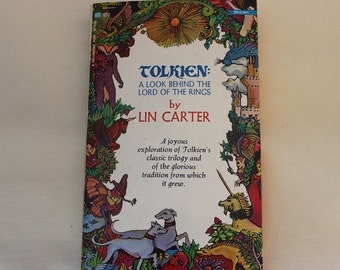Extollager
Well-Known Member
- Joined
- Aug 21, 2010
- Messages
- 9,241
Herewith, a thread for people who'd like to tell how one or more of the books Carter edited (or even ones he wrote??) contributed to their adventures in exploring imaginative fiction.

My memory is that I bought a copy of his anthology The Young Magicians when it was a new release. (Its publication date was October 1969.) Aged 14, I recognized Ballantine as Tolkien's paperback publisher -- I was a confirmed Tolkien fan, and indeed this book contained two "new" poems by Tolkien, as well as a poem by C. S. Lewis, whose Narnian books I knew and loved by then. These two remain absolute favorites, writers who have grown with me, fresh and delightful, wise and encouraging.
Most of the authors in this book, however, were new to me, and either I read them first in it, or in other books that I got hold of at about the same time. So far as I can now recall, it was in this book that I first read William Morris, E. R. Eddison, A. Merritt, etc. Here, I suppose, I first encountered the term "Cthulhu Mythos" -- so questionable a term for some serious readers of Lovecraft. It seems that, to me, "Cthulhu" looked vaguely Mayan or Aztec (I wouldn't have been very clear about the difference), so that I had a very vague impression that a "Cthulhu Mythos" story might involve fantastic adventures in the Andes. The bibliography at the back tickled my imagination.

I'd already bought and read Carter's Tolkien: A Look Behind The Lord of the Rings, which is open to objections, certainly, but was a nifty thing to fall into a middle-school-age kid's hands. Here I would have read of Rider Haggard's She for the first time, as a book that Tolkien admitted had influenced him. I didn't wait too long to make good on the nudge implied, and have ended up reading 25 or so of Haggard's books, although a number of these are ones I downloaded from Project Gutenberg, printed out, and bound with staples. A typical Haggard novel might require three "volumes" of stapled sheets.
I'll have another Carter-related story or two later, I expect.

My memory is that I bought a copy of his anthology The Young Magicians when it was a new release. (Its publication date was October 1969.) Aged 14, I recognized Ballantine as Tolkien's paperback publisher -- I was a confirmed Tolkien fan, and indeed this book contained two "new" poems by Tolkien, as well as a poem by C. S. Lewis, whose Narnian books I knew and loved by then. These two remain absolute favorites, writers who have grown with me, fresh and delightful, wise and encouraging.
Most of the authors in this book, however, were new to me, and either I read them first in it, or in other books that I got hold of at about the same time. So far as I can now recall, it was in this book that I first read William Morris, E. R. Eddison, A. Merritt, etc. Here, I suppose, I first encountered the term "Cthulhu Mythos" -- so questionable a term for some serious readers of Lovecraft. It seems that, to me, "Cthulhu" looked vaguely Mayan or Aztec (I wouldn't have been very clear about the difference), so that I had a very vague impression that a "Cthulhu Mythos" story might involve fantastic adventures in the Andes. The bibliography at the back tickled my imagination.

I'd already bought and read Carter's Tolkien: A Look Behind The Lord of the Rings, which is open to objections, certainly, but was a nifty thing to fall into a middle-school-age kid's hands. Here I would have read of Rider Haggard's She for the first time, as a book that Tolkien admitted had influenced him. I didn't wait too long to make good on the nudge implied, and have ended up reading 25 or so of Haggard's books, although a number of these are ones I downloaded from Project Gutenberg, printed out, and bound with staples. A typical Haggard novel might require three "volumes" of stapled sheets.
I'll have another Carter-related story or two later, I expect.

